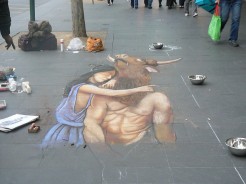A point of listening
When I was 15 or so, I had to do work experience. Clearly my only experience of work till then had been teachers, so I ended up helping in a class at my old primary school for two weeks. There I met William, a 5-or-6-year-old whom I was asked to read with because he was struggling a bit. Every time William encountered a word he didn’t know, he would say something instead. “The cat sat on the something.” “The ball something over the something bridge.”
That’s all I remember about William, if his name was even William, but I remember him every time I try to read a French book in French, which is something I do considerably often considering I am not very proficient in French.
I was reminded of all this today at an event called Points of Listening 6. I had not been to any of the previous five, so was not sure what to expect. What happened was really lovely. Daniela Cascella performed a reading of various texts – written, cinematic, acoustic. We were at the London College of Communication, and had been led through the building, around which students were strewn like fashionable throws or functional objets d’art, to a small, rather warm room with three arcs of seats and the curtains drawn.
Cascella began with film and sound of a gang of motorbikes being ridden round a (presumably Italian) city, their engines recapitulating the undulating monotony of televised Formula 1 races. Then we heard the sound from the opening credit sequence of Kiss Me Deadly. Then we saw the opening credit sequence of Kiss Me Deadly and understood more or less than we had understood from the sound alone.
The piece was called ‘Borders’, and from this opening position of credits marking a boundary of sorts between not understanding and understanding a situation, Cascella defined, developed, decayed, regained and recycled a sequence of cyclical themes to the end of the world and back.
In amongst it, she said she had read a 500-odd page book by a seminal French anthropologist; a self-anthropology, if such a thing is even possible. But to add to the monstrosity of the tome, she revealed that she does not read French very well and there is no English translation. So, she took it to the British Library and sat with it, reading, sometimes without understanding but still able to enjoy – perhaps more so – the objectiveness of this text. “Le chat s’assit sur le something.”
Talking to aliens
In the Q&A afterwards, Cascella mentioned that she had been discussing recently the topic of talking to aliens. Without going in to details, she told us the conclusion she and her interlocutor had reached was that we are always talking to aliens.
And then I put up my hand and spoke.
This never happens. It’s not that I don’t have interesting thoughts when listening to talks and performances, and it’s not that I am not grateful to the speaker or performers who inspire those thoughts. It’s just that I have this internal damping mechanism that suggests it is enough to have the thought or feeling: maybe jot it down in a notebook somewhere; expressing it would serve nobody well.
Alcohol has been known to override this mechanism but I had not been drinking today. Perhaps it was the opportunity afforded by being granted honorary alien status that enabled me to speak.
I was at another conference on silence last week, since which it has occurred to me that you have to listen in order for there to be a silence. An unheard silence is just another tree not falling in a philosophical wood. Perhaps, then, you also have to speak in order to listen.
So I spoke and made a point or two.
Points of listening, I hope.

